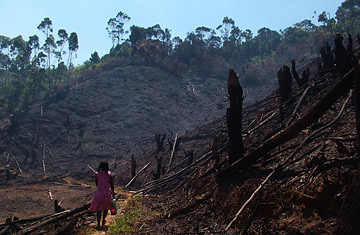
A destroyed forest in Madagascar.
The slow greening of world opinion has focused thus far on the problems of the physical environment, notably climate change, pollution, and depletion of nonrenewable resources. Priority is granted to the short-term needs of human beings, and that of course is as it should be. But might we now balance the agenda by paying more attention to the rest of life? Here is a rule of thumb in planet management to consider: if you save the living environment, comprising plants, animals, and microorganisms, you will automatically save the physical environment. But if you save only the physical environment, you will ultimately lose both. Humanity lives not just on the surface of planet Earth. We also, and above all, live in the biosphere. This membranous film of life, teeming with millions of different kinds of organisms, is so thin it cannot be seen edgewise when viewed from a space shuttle. Yet it is our cradle and our only home, blessed with the unique and delicate conditions necessary for human existence. To travel outside the biosphere, even a little bit and for a short period of time, requires the most advanced engineering we can devise, and even then it is always dangerous.
Other species are not just fellow inhabitants of Earth's equitable environment. They create and maintain it far from the physical and chemical state the planet would be in if it were lifeless. Humanity absolutely requires a healthy biosphere for a simple reason: we evolved over millions of years to fit the exact conditions it provides, and no other.
The natural world we are now obliterating with such cheerful abandon cleanses and efficiently distributes our fresh water; it creates and constantly renews our soil; it channels the great cycles of materials and energy; it sustains whatever climatic stability we have not yet perturbed; and it manufactures the very air we breathe. All these services together have been estimated to equal in dollar value the summed Gross Domestic Products of every country in the world combined, and is given to our species free of cost.
True, humanity could, in theory at least, continue to exist on the handful of domestic plants and animals it now uses, plus a tightly regulated marine catch, but it would be an impoverished and biologically unstable world. A planet thus humanized would then be literally a spaceship, with all the warmth and security of the little ones we currently keep in orbit.
To erase the variety of life forms composing the biosphere diminishes humanity in other ways. Each species is a masterpiece of evolution, exquisitely adapted during thousands to millions of years to fit a particular part of the environment. When it is extinguished, we lose the vast amount of scientific information it offers. We forego the option of exploring it for potential new pharmaceuticals, food sources, soil restoration agents, and other unpredictable products and services. A species that vanishes this year is of no more value to us than one that vanished with the dinosaurs.
How fast is biodiversity disappearing due to human activity? Before humanity became a major player, and especially after we invented agriculture, the natural extinction rate was very roughly one species out of every million species each year. The species birth rate was close to the same level, creating a near equilibrium through most of geological time. Now the extinction rate is in the vicinity of thousands of times the ancient baseline and risingmostly due to habitat destruction, pollution, and the explosive spread worldwide of harmful alien species. The damage and future risk is highest in "hot spots" of the world, those natural habitats that harbor especially large numbers of endangered species. The most critical of these, including the beleaguered forests of the Philippines, Madagascar, West Indies, and Hawaii, have suffered close to 90 percent loss of their original cover. At that level, only about half the species can survive indefinitely. If the remaining 10 percent is destroyed, the remnant species limited to them will plummet toward zero.
Should relative lack of attention to the living world continue through indifference to its practical importance, perhaps its moral and spiritual significance will strike home. Do we really wish to let a large part of biodiversity disappear on our watch? Fortunately, most of the major religions are awakening to this issue. Whatever we think of its origin, and whether call it the Creation or a product of evolution, the need to rescue biodiversity is a transcendent value for all. A welcome trend now in evidence is the growing number of religious leaders, scientists, and conservationists willing to collaborate in order to save humanity's most important natural heritage.